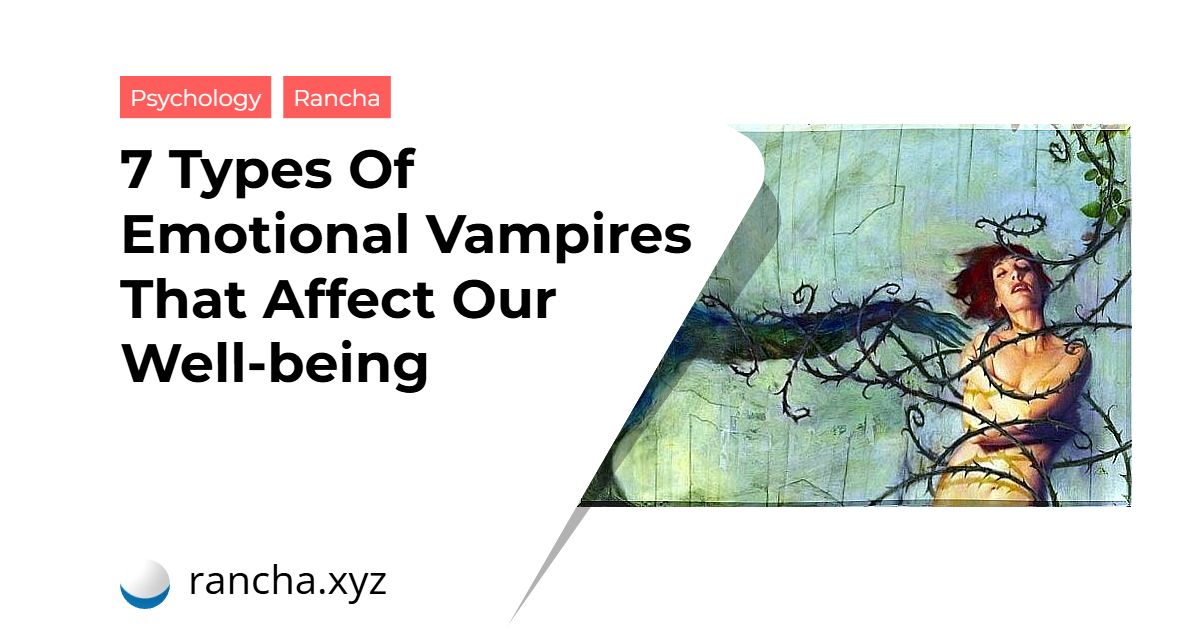Emotional vampires don’t take our blood, but our vitality, our spirits and our energy. They are lurking in almost any setting to progressively create negative contexts in which one side feels drained, isolated, and surrounded by a kind of stressful interaction that can seriously undermine their own physical and psychological health.
Although the term “emotional vampire” is not at all scientific and the fact that no diagnostic manual has established a protocol for its identification, it is “popular psychology” that stimulated the definition of a very concrete profile that is known and familiar to any a. Much has been written about them. We have at our disposal an infinity of books; however, it is necessary to give prominence to the more subtle characteristics.
One of them refers to “energy”. It is often said that emotional vampires “absorb our vital energy.” Well, if we lift that veil à la Edgar Allan Poe, we will actually discover something much deeper and, at the same time, worrisome. When we establish relationships with other people with whom we are involved, we also carry out a harmonious exchange of stimuli, support, information, emotions and sensations.
This magic of human interactions always produces a series of changes at the brain level, which will be accompanied, in turn, by a reward, by a positive chemical charge thanks to our neurotransmitters. However, when we’re dealing with an emotional vampire, there are no tradeoffs. The treatment is always unidirectional, there is no flow in communication, there is no “I give it to you and you give it to me”, there is no such positive reciprocity that our brain recognizes as healthy and meaningful.
What actually exists is the load of negative emotions that, when accumulated day after day, cause excessive brain stimulation and a corrosive feeling of stress with which two things can happen: either we are nullified, becoming trapped and vulnerable, or it causes in us a more adequate response, flight.

Emotional vampires and their effect on our health
At the beginning, we said that the term “emotional vampire” was coined by “popular psychology” when, in reality, this dynamic and this type of profile are increasingly identified in clinical practice and in the daily work of many psychologists. We cannot forget that it is in the “energy” we are talking about that our spirit, our motivation and our self-esteem are united, it is this that allows us to carry out any activity.
Thus, any negative and constant interaction in our daily lives presupposes a progressive and irremediable wear. We also point out that the impact of emotional vampires is now much more intense due to a very concrete fact: new technologies. The cell phone that we don’t turn off even at night is a common tool for the energetic vampire, who thanks to WhatsApp, Facebook or Twitter can have a much more constant presence.
Emotional Vampire Contagion and Its Consequences
There are many “races” of emotional vampires. The co-worker who always tells us about their problems, who tells us negative rumors, malicious gossip or even the toxic father or mother, those relatives who control us through victimism, who submit us to their choking networks, to their universes without empathy and respect.
We could give a thousand examples and yet they would be few because we all have some of them in mind, an emotional vampire who, intentionally or unintentionally, makes us lose our temper, drains our joy and submits us to his path full of discouragement. In turn, and not least, all these tricks work thanks to a wonderful element that we all possess: our mirror neurons.
They are the ones who mediate this emotional contagion. They force us to listen to the emotional vampire and to be sensitive and receptive to everything that is transmitted to us: fear, hate, unhappiness, bitterness, worry… The greater the negative charge, the greater the wear, the greater the excessive excitement in our brain, the greater the stress and weakness.
These are the symptoms that we are noticing little by little.
- Tiredness.
- Eyelids heavy.
- Headaches caused by tension.
- Diminishment of Mood.
- Feeling of wanting to run away.
- Concentration problems.
- Low income at work.

Types of Emotional Vampires
Judith Orloff is a renowned American psychiatrist and writer who has devoted many books and studies to the subject of empathy, emotional contagion and the concept of emotional vampires. In her work, something that she makes clear to us from the beginning is that not all people who fit this profile are aware of what they are like, that their interactions and behavior have a negative impact on those around them.
Other people, on the other hand, not only know but also seek this behavior with a very concrete objective: to achieve domination and reinforce their own self-esteem. Submitting the other for one’s own benefit is a common strategy of the emotional vampire. Now let’s look at the 7 typologies.
1. the narcissist
Its motto is “Me First”. Everything has to do with them. They crave admiration, recognition and the feeling of approval. They lack empathy and will always force us to make everything, every aspect around us, in accordance with their expectations, their principles and their opinion. They have a very limited ability to recognize or take other people into consideration so that they can offer real affection, real friendship, or real love.
How to protect yourself?
- The secret comes down to knowing how to communicate with them, setting limits, being honest, and showing your tedious ego and your diminished ability to take other people into consideration.
- We must avoid offering our self-esteem to them, for this it is necessary to know how to see them objectively, being always aware of the affective and relational poverty they have.
2. The critic
Nothing you do, say, think, or value will suit the critical personality. Nothing will be good for your refined taste, your wise concept of life and your infinite knowledge. However, beware, because his greatest skill is to converse with subtle affection and ironic paternalism in order to always manage to make you feel inferior.

How to protect yourself?
- Use your shield of protection and disable the power these criticisms can exert on you.
- You can take away the power of the emotional vampire if you make it clear that his opinions are of little importance and that you know what’s right and wrong.
3. The tireless talker, the one who doesn’t hear
The inexhaustible talker is not interested in what you have to say, your thoughts or feelings. He just wants you to be there to listen to him, to be a “container” where to dump everything, where to unload all your things like someone who throws the garbage to be recycled.
If you have the tireless talker by your side, the physical and emotional exhaustion is visible and very intense.
How to protect yourself?
- These individuals do not respond to nonverbal cues. So there is no other option but to cut them off in a forceful but polite way.
- Make it clear that you are not there to hear everything he has to say, that you are not his personal diary, his litter box, his warehouse. You are a person to dialogue with, someone who also has needs and wants to be heard.
4. The victim
The constant victim, with whom the worst always happens and who the world has abandoned – in her opinion – always on the sidelines, can be immediately recognized because his speech is always negative. They see themselves as a voodoo doll that receives constant and persistent blows.
How to protect yourself?
- Behind this type of person there is low self-esteem and we should keep this in mind from the beginning.
- It is best to rationalize all of the person’s tragedies as far as possible. We must avoid being hard on this type of person. It is better to be a lucid gaze with which, little by little, it is possible to make the person see that everything has a solution and that he must take the reins of his own life responsibly.
5. The controller
This type of person will try to practically obsessively control every aspect of your life. She will manipulate your emotions to try to cancel you out, to leave you breathless, without positivity, without self-esteem and even without identity. The controller invalidates us to the point of convincing us that everything we need comes down to just one thing: him.

How to protect yourself?
- The key to success in defeating a controller is assertiveness and self-confidence.
- Never “let yourself go” or “convince”. Appreciate the advice and make it clear that you believe in another way of acting that has always been most helpful throughout your life.
6. The aggressive
Emotional vampires who use anger and verbal or physical violence are the most dangerous. Sometimes all it takes is a misunderstanding and, almost without knowing how, the anger, contempt, or senseless anger that leaves us scared and breathless appears. They are like a minefield, where it is almost impossible to control everything to avoid the explosion.
How to protect yourself?
- The most useful strategies in relation to this type of profile are two: When we have a person with violent behavior on our side, we only have the option of recommending help so that the person can manage to control this type of reaction.
- If she doesn’t follow this advice or doesn’t want to, the healthiest – and necessary – is to move away.
7. The sarcastic
Some see sarcasm as a sophisticated language tool from which to see the ironic side of life. Whenever we see it from that perspective, everything will be fine. However, the moment sarcasm is used to ridicule people, to gracefully humiliate them, and step onto the podium of creativity with the crown of cruelty, we should know: we are dealing with an emotional vampire.

How to protect yourself?
- Sarcasm is a subtle weapon that we don’t see coming. However, be careful, when we feel humiliated and with self-esteem reached, it is necessary to set limits. When this is done before, the better.
- We must make it clear and say out loud that this phrase did not sit well with us. Faced with laughter and “it’s just a joke”, we must assertively reiterate that “this joke is not convenient because it hurts people”.
- If the sarcastic person can’t see the effect of their actions and doesn’t change at all, it’s best to back off.
What if I’m one of the emotional vampires?
At this point, the question is almost unavoidable and even mandatory… Are we engaging in stressful behaviors and emotional vampirization with other people? Beyond what we might think, most people, at some point in their lives, have already performed some of these behaviors. Either because we had low self-esteem or because we were going through a difficult time in our lives.
However, it never hurts to reflect on some indicators that can warn us about this type of behavior.
- Negative and catastrophic thoughts.
- Need to have everything under control, especially the people around us.
- Need to dump on other people without taking into account their concerns, opinions or comments.
- Be very critical of other people.
- Constant feeling that everything is wrong, that the world seems to be against you.
- Know that things aren’t going well, but don’t let yourself be helped. And get angry when someone tries to help.
If these situations are common, don’t hesitate to take an act of reflection. First, you need to strengthen your self-esteem, improve your emotional control, and improve your communication skills. On the other hand, don’t hesitate to seek help from a professional, because sometimes depression can be hidden behind this negativity.
There are many types and strains of emotional vampires. However, and to conclude, most of them can be humanized again with the right help and with more sensitive and correct guidance.
Bibliography
-Albert J. Bernstein (2011) Emotional Vampires : Edaf
-Judy Orloff (2017) Empath’s Survival Guide. New York: Harmony Books
 rancha.xyz Be free to choose their own route to self-knowledge, health and balance of body and soul.
rancha.xyz Be free to choose their own route to self-knowledge, health and balance of body and soul.




